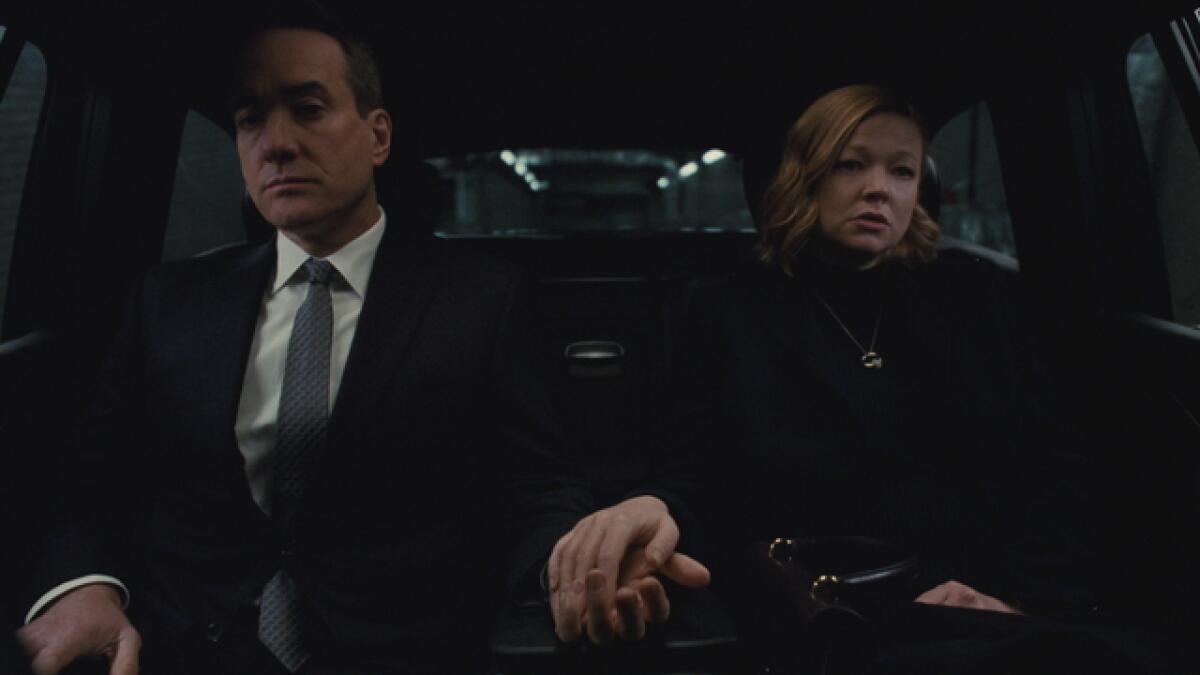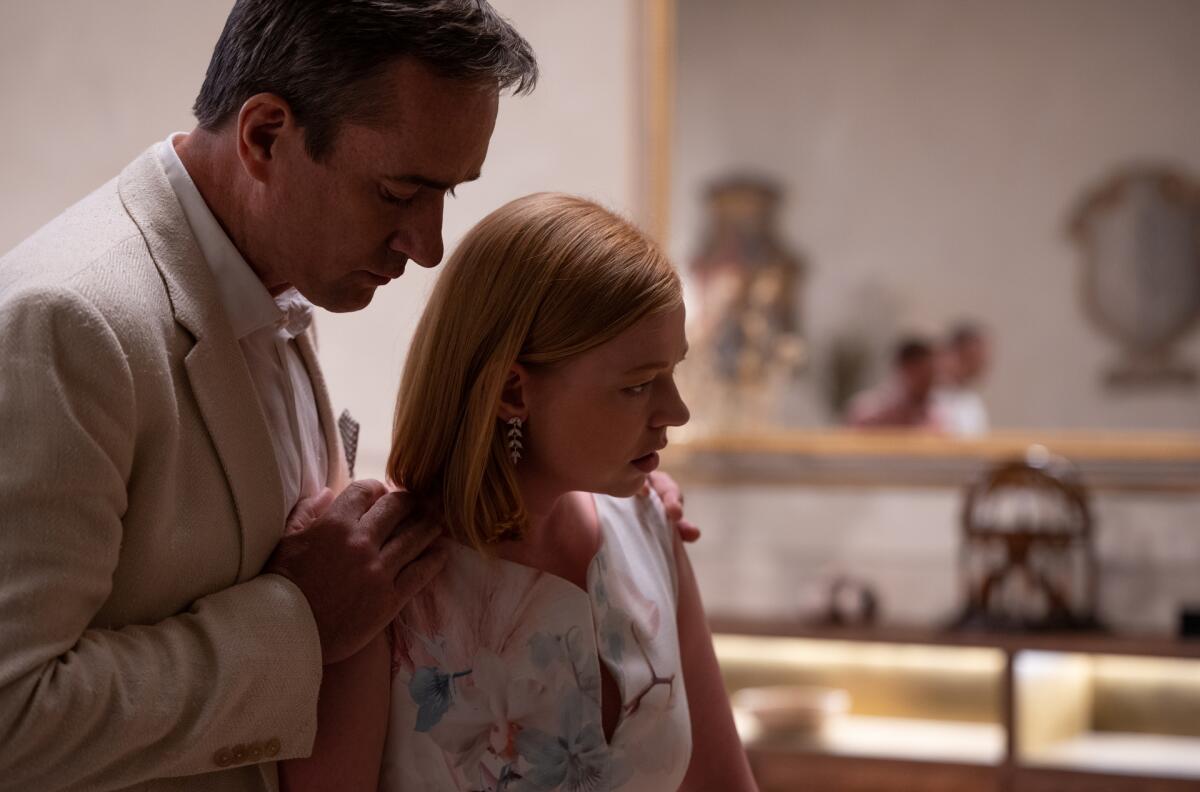How ‘Succession,’ a show about business, became a show about marriage

- Share via
Never underestimate a corn-fed basic from Hockeytown.
In the heartstopping series finale of “Succession” on Sunday night, striving Midwesterner Tom Wambsgans was named chief executive of Waystar Royco, completing his transformation from groveling buffoon to business titan.
After years of personal and professional humiliation, and of nonstop scheming and marital backstabbing, the man who once sucked up to Logan Roy by buying him a Patek Philippe watch became his official successor. Now that Waystar is owned by GoJo, Tom may be a powerful lord within someone else’s empire — it’s a title he earned through fawning submission rather than ruthless conquest — but a throne is still a throne.
And he has a consort by his side — at least for now. In one of the most stunning twists in an episode full of breakneck narrative turns, Tom, the newly coronated chief executive, drives off into an uncertain new future, hand-just-barely-in-hand with Shiv Roy — his estranged wife, the woman carrying his unborn child, and the very person he betrayed to score the top job.
Times staff breaks down the HBO series’ finale, including Shiv and Tom’s power swings, the Roy sibling rivalry, the company’s new CEO and more.
Along with who would succeed Logan to become chief executive, the question of whether Tom and Shiv’s uniquely toxic marriage would survive — and if it even should — became the show’s most gripping storyline. In the end, their relationship is still intact, but it has morphed into something colder, more calculating: a tentative, probably doomed alliance. Certainly not a romance.
Over the course of four seasons, Tom and Shiv’s thorny partnership moved from the margins to the very center of the narrative, becoming a lens through which creator Jesse Armstrong explored the role that power plays in intimate relationships. When Shiv got pregnant, the business and personal storylines merged, and the fate of their marriage became inseparable from the succession battle.
“Succession” was, on its face, a show about sibling rivalry and the dynastic struggle to control a conservative media conglomerate. But like so many other great TV dramas of the last two decades — “The Sopranos,” “Mad Men,” “Breaking Bad” — “Succession” was also a show about a uniquely awful marriage, poisoned by money, class and noxious gender politics.
All of those shows were superficially about other things: organized crime, the ad business, drug dealing. Yet each used marriage to examine the lies people are willing to tell themselves, the humiliations they’ll endure, and even the crimes they’re willing to be complicit in if their personal comfort is assured. This triggered a misogynistic reflex in some viewers, who vilified TV wives like Carmela Soprano, Betty Draper and Skyler White while reveling in the misdeeds of their husbands.

What made Tom and Shiv unique in the Prestige TV canon was how they seemed to invert the typical power balance between husband and wife: Tom was the gold-digger who married above his station and enjoyed the perks of someone else’s ill-gotten fortune, while Shiv was the philandering partner who repeatedly embarrassed her spouse and was able to do so because she held the purse strings.
From the moment we first met Tom in the series pilot — standing outside a luxury jewelry store on the Upper East Side, asking Shiv what to buy Logan for his 80th birthday — he was subservient. And for three out of four seasons, Shiv gleefully wielded the upper hand in their relationship, taking an almost erotic thrill in dominating her husband in a way she was never able to do with her father.
When he proposed in the hospital, where Logan was recuperating after a stroke, she sneered: “I’m not gonna give you a blow job when your dog dies.” On their wedding night, she informed Tom she wanted an open marriage. While debating who would be the “blood sacrifice” to take the fall for the cruise division scandal, Shiv told her husband he would be a logical candidate because “you’re like family … but also not family.”
The pattern of humiliation and begrudging reconciliation continued until the Season 3 finale, “All the Bells Say,” when Tom betrayed Shiv (along with Kendall and Roman) to Logan, forever disrupting the power balance in their marriage.
Tom had made the wise calculation that loyalty to his father-in-law was more valuable than loyalty to his wife. As he later explained to Shiv, “All my life, I’ve been thinking a little bit about money. How to get money and how to keep money. You kept me out, Shiv, you kept me out. I always agreed to all the compartments, but it seemed to me that I was always going to be caught between you and your dad. And I really, really love my career and my money and, you know, the suits and my watches.”
The Australian actress who portrays Siobhan ‘Shiv’ Roy in the HBO drama reflects on the end of the series and how she has evolved alongside her character.
As Tom and Shiv separated, reconciled, then split up again following Logan’s death in Season 4, viewers came to understand more about what brought these two damaged people together. The kinky game of “bitey” they played at a Hollywood house party in “Living+” was a perfect metaphor for their relationship: Let’s inflict as much pain as we can on each other until one of us gives up.
Once Logan died, it became harder for Shiv to inflict emotional or professional damage on Tom. Even her decision to keep her pregnancy secret from a man who once tracked her menstrual cycle on his phone because he was so eager to conceive was not a tactic so much as a desperate act of self-preservation by someone who knows being “the baby lady” at the office is rarely a good thing. Even when it’s the family business.
And she’s right: In “Succession,” gender and misogyny may be more immutable forces than money, and even Shiv, for all her supposed competence and girl-boss swagger, can’t avoid them forever. And she certainly can’t stop Lukas Matsson from passing her over for CEO because he’s too disturbed by his attraction to her (and, no doubt, by the perception that he has become her puppet).
In the end, Shiv’s most valuable asset was her vote, and she leveraged it to devastating effect.
When faced with a choice between Kendall, the brother who killed someone then pretended he didn’t, or Tom, the husband who stole her father and then her job from under her nose, she chose the latter. She made a grim but clear-eyed calculation that siding with Tom would offer the most viable path to maintaining the power and lifestyle to which she was accustomed, just as Tom did when he aligned with Logan.
Shiv may be right that “once you’ve said and done the worst things [in a relationship], you’re kind of free.” But in the end, as she tepidly congratulates Tom on his new job without making eye contact, she appears to be a woman trapped. The views are panoramic, the sheets have a high thread count, but it’s a prison all the same.
More to Read
The complete guide to home viewing
Get Screen Gab for everything about the TV shows and streaming movies everyone’s talking about.
You may occasionally receive promotional content from the Los Angeles Times.








